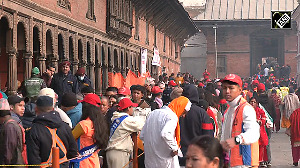Former prime minister Manmohan Singh, the architect of India's economic reforms and a consensus builder in the rough world of politics, died in New Delhi on Thursday night.

He was 92.
An AIIMS bulletin said "he(Singh) was treated for age related medical conditions and had sudden loss of consciousness at home" on December 26.
"Resuscitative measures were started immediately at home. He was brought to medical emergency at AIIMS Delhi at 8.06 pm. Despite all efforts, he could not be revived and was declared dead at 9.51 pm," the bulletin said.
Described as a reluctant politician and an accidental prime minister, Singh, who headed the Congress-led UPA government for two terms from 2004 to 2014, had been in poor health for the last few months.

He is survived by his wife Gursharan Kaur, a history professor, and three daughters.
Congress leader Priyanka Gandhi Vadra and her mother Sonia Gandhi reached the hospital as soon as the news of his hospitalisation became known.
Government sources said a seven-day national mourning will be observed and that Singh's last rites will be conducted with full state honours.
Singh, a renowned economist who was the finance minister under the then prime minister P V Narasimha Rao, was the architect and the brainchild of economic reforms in 1991 that pulled India from the brink of bankruptcy and ushered in an era of economic liberalisation that is widely believed to have changed the course of India's economic trajectory.
Singh's appointment as the finance minister was a turning point in the economic history of independent India which witnessed bold economic reforms, abolition of licence raj and opening of many sectors to private players and foreign players so that capital could flow in.
A former RBI governor, he is credited with allowing Foreign Direct Investment, rupee devaluation, moderation in taxes, and privatisation of public sector companies.
Singh died as the Congress party concluded its Congress Working Committee meting at Belagavi in Karnataka, where all top party leaders were present.
The Indo-US nuclear agreement clinched in 2008 during Singh's first term was a landmark that enhanced India's global status. Singh stood firm on the nuclear deal which will remain a crowning glory of his prime ministership.
The Left Front withdrew support to his government over the deal but the prime minister won the vote of confidence after the Samajwadi Party(SP) gave its backing.
A soft-spoken leader, a gentleman politician and a man of few words, Singh battled allegations of corruption against his government including the coal scam and the 2G telecom scam which eroded the UPA government's hold over power and gave an opportunity for the BJP's rise and march to victory in the 2014 Lok Sabha elections.
Paying tributes to his predecessor, Prime Minister Narendra Modi said India mourns the loss of one of its most distinguished leaders whose wisdom and humility were always visible.
Rising from humble origins, he rose to become a respected economist, Modi said, noting that Singh served in various government positions as well, including as finance minister, leaving a strong imprint on our economic policy over the years.
In a post on X, Modi said, "His interventions in Parliament were also insightful. As our Prime Minister, he made extensive efforts to improve people's lives."
During the fag end of his tenure as PM, Singh was seen defending his government's record and the Congress' positions on controversial issues and said he was not a weak prime minister.
"I hope history will be kinder to me than the contemporary media," Singh, who was often described as a man of thought and of integrity, had said in January 2014.
Though Singh was politically inactive in his final years, the Congress used his stature to take on the Modi government on a range of issues.
He was highly critical of demonetisation exercise in 2016 as "organised loot and legalised plunder".
In May this year, Singh had delivered a scathing rebuke to his successor Narendra Modi, accusing him of diminishing the stature of the Prime Minister's office through his "hateful and unparliamentary" rhetoric targeting a specific community.
Maintaining that his two terms as prime minister in UPA I and UPA II displayed the Congress's ability to run a coalition government and dispelled the perception that this party cannot run coalitions, Singh had also earlier said that though some compromises were made in the process, they were on "peripheral issues and not on national problems".
President Droupadi Murmu described Singh as "one of the greatest sons of Bharat" who made critical contributions to reforming the Indian economy.
Forrmer Deputy National Security Adviser Pankaj Saran, who had worked with Singh during his prime ministerial tenure, said he was a man who symbolised humility and collegiate style of functioning. "He was a consensus builder. A very simple man who did not expect to become the prime minister," Saran told PTI.
NN Vohra, who was appointed Governor of Jammu and Kashmir during Singh's tenure, said his death is the end of a "truly rare species of political leadership, which was marked by exceptional intellectual capability, honesty, transparency and unparalleled humility."
"A man of very few words, he heard everyone, high and low, and tackled the most complex issues by taking his own decisions which best served the national interest," he said.
Singh is the only PM who held prime minister's office without winning a popular vote. He ended his 33-year-long parliamentary innings in the Rajya Sabha on April 3











 © 2025
© 2025